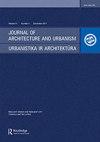荷兰小学的转换策略:实践与改进
IF 0.8
0 ARCHITECTURE
引用次数: 2
摘要
战略性房地产管理手册一般基于四种功能调整策略:转换、扩建、改造和适应性再利用。在战略层面上,这种调整策略的分类对房地产总体上是有效的。但是,当把荷兰的小学看作一种特定类型的房地产时,现实可以而且是更加微妙的。在一项关于荷兰小学和儿童中心空间适应性的研究中,其他住宿策略也脱颖而出。《学校建筑地图集》(荷兰语出版,名为Scholenbouwatlas)对100所学校建筑进行了分析,发现在实践中普遍存在九种主要策略。这种策略的细化(更好地)适合小学的综合转化行动,其中几个方面是一起解决的。在接下来的文章中,这些策略将在理论背景下进行分析和讨论。分析的结论是,现有的一般模型在具体的小学房地产案例中,建筑存量的战略处理是可以细化的。本文章由计算机程序翻译,如有差异,请以英文原文为准。
CONVERSION STRATEGIES FOR DUTCH PRIMARY SCHOOLS: PRACTICE AND REFINEMENT
Handbooks on strategic real estate management are generally based on four strategies for functional adjustment of the building: Conversion, expansion, renovation and adaptive reuse. And on a strategic level, this classification in adjustment strategies does work for real estate in general. But when looking at Dutch primary schools as a specific type of real estate, reality can be and is more nuanced. Other accommodation strategies came to the fore in a study into the spatial adaptation of primary schools and children’s centres in the Netherlands. An analysis of 100 school buildings studied in the Atlas of School Building (published in Dutch as Scholenbouwatlas) revealed that nine main strategies were prevalent in practice. This refinement of the strategies fits (better) with integrated conversion actions of primary schools in which several aspects are solved together. In the following article these strategies are analysed and discussed in a theoretical context. The conclusion of the analyses is that the existing general models in the strategic handling of the building stock in the case of specific real estate of primary schools can be refined.
求助全文
通过发布文献求助,成功后即可免费获取论文全文。
去求助
来源期刊

Journal of Architecture and Urbanism
ARCHITECTURE-
CiteScore
1.30
自引率
14.30%
发文量
12
审稿时长
15 weeks
期刊介绍:
The Journal of Architecture and Urbanism publishes original research on all aspects of urban architecture.
 求助内容:
求助内容: 应助结果提醒方式:
应助结果提醒方式:


